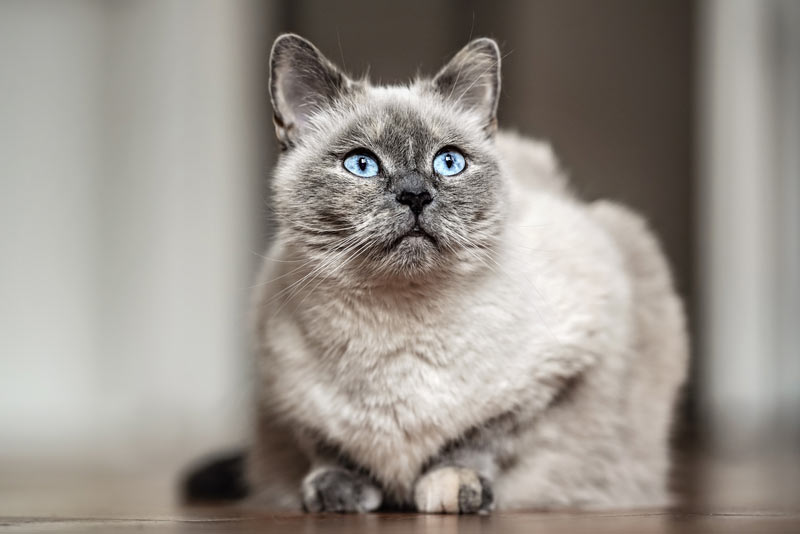Caring for Your Aging Cat

Caring for an aging cat can be challenging at times but having the right knowledge and a little patience can make it much easier. Since most senior cats slow down a bit in their old age, it is important to know when to see their veterinarian and how to keep costs down. Use this guide to help you care for your geriatric kitty, and please feel free to contact the Catsultant® if you have additional questions.
Be Observant
One challenging thing about caring for our feline family members is determining if they are sick or in pain. Some symptoms are obvious — repeated vomiting, a lack of appetite or change in litterbox habits, for example. However, other signs of disease can be harder to detect in the early stages, such as cancer, arthritis, dental disease and kidney failure. Since cats are hard-wired to hide their pain, we must be extra diligent about watching for even any subtle changes in their routines, their body movements, their dietary habits and their behavior.
When cats are in distress, they tend to keep to themselves more than usual and may even start hiding. They might eat less, sleep more, or be more vocal. It is imperative that senior cats get a thorough vet check-up, including at least a CBC, at least once a year and some vets recommend twice a year. Choose a cat-savvy, cat-friendly vet! (70% of vets are dog people.) It is much cheaper to identify any health issue and treat it as early as possible. Remember to get your cat’s teeth cleaned AND x-rayed about once a year because we now know that kidney failure, which is common in senior cats, often begins in the mouth from either abscessed teeth (OUCH!) or periodontal disease—or both!
Giving medications
Administering medication to an aging cat can be a challenging undertaking, especially if you cannot mix it with food. The easiest form of medication to give is usually in pill form. There are devices (Soft-tipped, plastic plunger-like “pillers”) you can buy to make it much easier but making a pill “meatball” makes it more appetizing for your cat—if they like the food and don’t suspect a pill is in it!
If your cat needs medications on an empty stomach, you might want/need to use the piller. If you need help, most vet techs at your vet’s office are willing to give you a lesson in pilling a cat. It is a great idea to practice first at the vet’s office before trying it at home.
Coping with vet bills
One major challenge for those who have older pets is the additional vet bills. It can be expensive to visit the vet as often as is necessary with an aging cat, which is why it’s a good idea to plan ahead and find ways to save money and set it aside for vet visits.
A great way to save money is by finding budget-friendly pet supplies for your cat online. Be sure to research a Chewy promo code before buying treats, food, or other items, and put aside the extra savings for the next vet appointment. Just make sure all the food and treats are healthy with NO by-products, wheat, corn or soy! Note: Healthy wet food is much easier to digest than dry kibble—and significantly reduces shedding too.
Supporting your aging cat
Much like humans, as cats age, they prefer and even thrive with predictable routines. Aim to reduce changes as much as possible and stick to a schedule to help your cat feel comfortable and secure. Feed your aging cat at the same time each day in non-plastic, shallow bowls will help. You might want to raise the height of her bowls to make it easier on her neck and upper back. Make sure she has clean water (change it at least once/day) in a glass, ceramic or stainless-steel bowl. Keep her open, easy-to-enter litterbox clean—scoop at least once/day and use only low-dust, unscented litter to avoid respiratory irritants in scented cat litter. Refrain from rearranging the furniture and keep gatherings to a minimum to reduce stress.
Try to find ways to spoil your cat in their old age. One great way to make them happy is by adding extra beds around the house and have some placed in a sunny place, if possible. If your cat has mobility issues, ensure the beds are easily accessible and in areas of the house where your cat feels most comfortable. Again, look for discounts to save on the added expense, as well as read through product reviews to ensure a good buy.
Even if your cat isn’t as spry as she once was, she still needs to play (hunt) to keep her active and entertained. Playtime might be more subdued but gently flicking a peacock feather around will usually get her attention and you may even get her to pounce on it if she is feeling energetic. Many cat toys are not very effective, and some are not even safe. If you are interested in a list of safe, effective cat toys, please feel free to contact me. (I do not sell cat toys—I just recommend the good ones!)
While your aging cat may require more care, be sure to treasure the time you have left with her. Be observant and watch for signs of discomfort or stress and set aside money for extra vet bills. Watch for sale pricing on healthy pet supplies online. Try to keep your routine as consistent as possible to help your older kitty remain stress-free as she ages. Playing cat music or spa-type music is also helpful and can help lower cat anxiety.
This article was co-authored by Jessica Brody and Lana Fraley Rich.